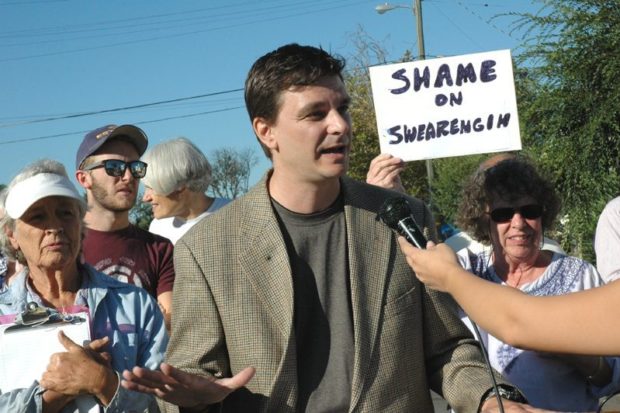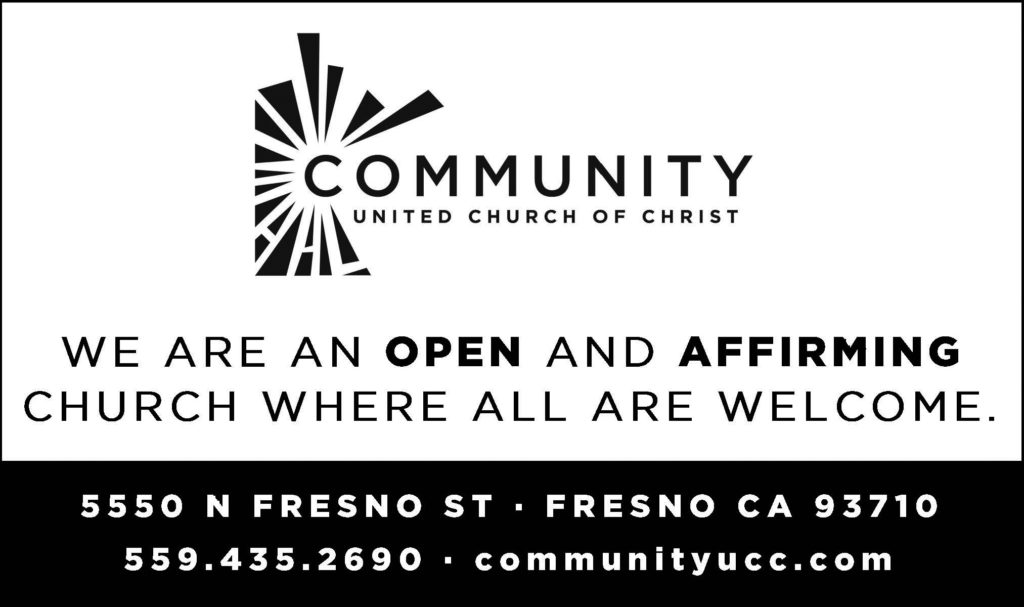
By Gerry Bill
(Editor’s note. Gerry Bill is responding to Mike Rhodes’ article about ending homelessness, which can be found HERE).
What we are doing is not working. Unfortunately, the political will appears not to exist in Fresno to do what needs to be done. Safe and legal campgrounds would be a big help—not to end homelessness but rather to make being homeless more tolerable. We have been asking for this for years.
Maybe the times have changed enough that the city would now be more open to the idea. The city is leaving Dez Martinez with We Are Not Invisible alone, even though city leaders call what she is doing illegal.
The Dakota EcoGarden (DEG) was technically illegal also, but Art Dyson has been working with the City of Fresno to make it legal. The city has found a way for there to be six units on the property legally, and that number could be even greater in the future with a waiver.
The DEG will be getting city permits for new structures to be built. The goal is to replace all eight tents with structures. That would be 10 structures in all, plus two bedrooms in the house, or a capacity of 12 (more with couples; the DEG has had up to 14 people). Still, that is a drop in the bucket compared to the need.
The evidence is that safe and legal campgrounds work best when they are kept small. Martinez has capacity for 12–14, as does the DEG, and that number is manageable.
Modesto tried a safe and legal campground for 300, and it was a disaster. It turned out not to be safe at all. There were two refugees from that camp who stayed at the DEG for a while, and they said the conditions in Modesto were horrible (e.g., thefts, drug dealing, rapes, people did not feel safe in their tents). Perhaps it was poorly managed, but the size was likely a factor.
So, to make a real dent in the problem, it would be best to have many, many small safe and legal campgrounds. Of course, Martinez and the DEG can do this because they are all-volunteer entities and don’t have to pay staff.
How would that work if we had 50 safe and legal campgrounds scattered around the city (50 × 14 = 700 residents—still not enough). Are there 50 full-time volunteers out there willing to do what it takes? Maybe people could be paid, but that can be a can of worms also. What kind of qualifications would be required to hire someone to do that? If you hire the wrong person and that person messes up big time, who is liable? Would there have to be someone overseeing all 50 sites? That doesn’t sound that workable.

Salt Lake City apparently acquired a lot of old motels and apartment buildings and converted them into housing for the homeless. From 2005 to 2015, the city reduced chronic homelessness by 91%. They were using the Housing First model whereby people are housed first, and then any other issues they have are addressed once they are housed. It took a lot of money, but they made it work. But the model requires sustained funding, and the funding in Utah has dried up. Sadly, homelessness there is starting to make a comeback.
In California, the state has created Project Homekey. The Fresno Housing Authority thinks it can provide 139 units with the funds it will receive from that, and Fresno County is proposing a 170-unit complex at the old Smuggler’s Restaurant at Blackstone and Dakota avenues. Every 300 people taken off the streets is a significant help, but we are dealing with thousands, and that number is expected to get much worse because of the current economic crisis.
So yes, all of these things should be done, but we are fooling ourselves if we think it will solve the problem.
Ending the Fresno Police Department (FPD) Homeless Task Force is a good idea, and in the current climate that might just happen. The bigger challenge would be to get those funds redirected to the things that would help.
For the money to go to social services would mean transferring money from the city budget to the county budget, which is politically difficult (city taxpayers paying for services, for example, in Sanger and Parlier). The money could go for water, trash bins and portable toilets, and that would be a city expense, if the city could be convinced to use the money in that way.
Of course, there will probably be a dozen other proposals about what to do with any funds freed up by disbanding the task force. In fact, the FPD would try to be first in line to use those funds for some other policing purpose. There’s the political will problem.
Let’s look at the assumptions in Mike Rhodes’ article:
The City of Fresno has the political will to make these changes. This is highly questionable.
The money can be found to make the transition from trying to maintain the current level of homelessness to ending homelessness. This is theoretically possible, but the devil is in the details. The money is likely there, but reassigning it from current uses will trigger huge resistance from vested interests already getting that money. It is all about whose ox is being gored.
No city or county department wants to give up its funding for the good of the whole. Back to the political will problem.
When homelessness is ended (or nearly ended), it will cost less than the current system. This is correct, but, unfortunately, it involves one entity spending more money so that another entity saves money. Former Fresno mayor Ashley Swearingen pointed this out at a homelessness workshop with Barbara Poppe in 2017.

Swearingen said the changes proposed by homeless advocates would save money in the big picture, but the savings are not “recoverable” by the city. For example, the city paying to house people would save hospitals money in ER admissions, but the county pays for ER admissions, not the city. So the city’s expenditure does the city’s budget no good because the savings go to another entity.
It’s a crazy system we have. In the United Kingdom, for example, it is not like this. The national government could set priorities and guidelines that had the force of law, so there are not so many jurisdictional rivalries.
All homeless people will be provided housing and social services, even if they still have addiction, mental health or other issues. This is what those in the movement support, so let us hope it is an acceptable assumption for the powers that be. This is the principle behind low-barrier, come-as-you-are shelters, and it is the foundational principle of the Housing First model used in Salt Lake City. That battle seems winnable.
We will acquire the resources (land, buildings, and money) to make this transition. This is within the realm of possibility—particularly the land acquisition, as the city, county and CalTrans have quite a bit of vacant land. As to the money, I think the city and county are counting on it coming from the state (as with Project Homekey). Will the state provide even more for this purpose? It would take quite a lot more.
Adequate housing can be found or created. This makes logical sense. There are lots of vacant houses and derelict buildings out there that could be repurposed. Some cities have instituted vacancy taxes as a way of trying to force property owners to put their vacant properties to good use. Richmond, Calif., apparently has pioneered this approach.
If a property is vacant for a long time, there is a tax to be paid unless the property owner can show good reason why it is being kept vacant (there have to be exceptions for houses with such issues as disputed ownership or being in probate). It seems that they are required to offer the property for rent at market rates or pay the tax. It is designed to discourage speculators from sitting on vacant properties for long periods of time.
Oakland is now doing something similar as well, also applied to the purchase of vacant properties, where a property trust for low-income households gets the first right of refusal when a vacant house finally goes on the market, and they are forced to put it on the market if they don’t meet other conditions.
There are enough resources to pay social workers and mental health professionals for the work needed. This is an important one. We probably need a whole lot more social workers and mental health professionals. DEG residents have sometimes been referred to County Behavioral Health and been told that the first available appointment is about six months away. That’s with current caseloads.
If more clients are added into the system, more mental health professionals would need to be hired. The county is unlikely to do that unless the state funds it. The money exists in society as a whole. Our society is awash in money at the upper levels. But that money doesn’t easily make its way into county budgets or the budgets of other entities that might effectively deal with homelessness.
All of this is being done to try to mitigate an inherent problem in capitalism. People are forced to work for less than a living wage. That benefits employers, not workers. Landlords try to get as much rent as they can to maximize their profits, benefiting property owners, not renters.
The gap between wages and housing costs keeps getting bigger and bigger. So, as suggested, universal healthcare, living wages and affordable housing are desperately needed, but they are all contrary to the logic of a capitalist system. Those changes need to occur on the macro level. The things we do locally might be seen as Band-Aids.
But, then again, wounded people need Band-Aids, and it is within our power to provide some of that. It’s better than nothing.
*****
Gerry Bill is professor emeritus of sociology and American studies at Fresno City College. He is vice president and treasurer of the Eco Village Project of Fresno, and as such oversees daily the operations of the Dakota EcoGarden. He is also on the boards of the Fresno Free College Foundation/KFCF, Peace Fresno and the Fresno Center for Nonviolence.

[…] Does the City of Fresno Have the Political Will to End Homelessness? Tagged […]